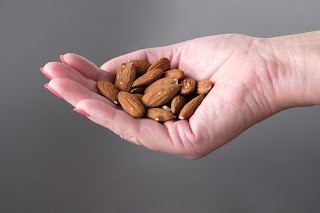By Staff Writer
Almonds are a type of fruit that grows on deciduous trees and have the scientific name "Prunus dulcis." Almonds have a firm, brown shell and are high in calories. Brown is initially prepared for eating by having its tough shell removed. The two varieties of almonds are sweet and bitter.Bitter and sweet almonds
There are two types: bitter almond and sweet almond (P. dulcis, variation dulcis) (P. dulcis, variety amara). The common edible sweet almond is consumed as a nut, used in cooking, or used to make almond flour or oil. Prussic acid must be taken out of the bitter almond oil before it can be used to make flavouring extracts for meals and liqueurs.
Almond Nutritional Value
Almonds are among the healthiest nuts and have a high nutritional value. A quarter cup (around 35 grams) of almonds has 206 calories, which is a lot of energy, along with 6 grams of carbs, 7.6 grams of protein, 4.1 grams of fibre, 18 grams of monounsaturated fat, and sugar (1.7 g). Vitamins A, B, and E are just a few of the vitamins found in almonds. It also provides vital nutrients and minerals including calcium, iron, magnesium, phosphorus, zinc, potassium, molybdenum, selenium, and folic acid that the body needs. Almonds are a complete food, thus.Almond and Health
Due to their ability to lower total and LDL cholesterol as well as their anti-inflammatory and antioxidant properties, almonds may help minimize the risk of developing heart disease. The large level of unsaturated fat in almonds encourages a better lipid profile, especially when this item is substituted for other foods high in saturated fat and refined carbohydrates. Plant sterols, such as those contained in almonds, may interfere with the absorption of cholesterol and bile acid. Additionally, almonds contain phytonutrients that promote the development of good gut bacteria. Controlled studies have demonstrated that regular nut consumption can lower insulin resistance, improve healthy blood vessels, and reduce inflammation.
Interestingly, research has not shown a connection between eating nuts and gaining weight despite the fact that they are high in calories. In fact, they have been linked to decreased rates of weight gain and obesity, probably as a result of the fat and fibre content's ability to increase feelings of satiety and fullness.
Almond Uses
Almonds can be eaten after removing their hard outer shell. Avoid processed or sugar-coated nuts since they reduce the health advantages of nuts. Almonds that have been too heated or roasted might lose their antioxidant benefits, therefore you should refrain from eating them.
The best way to eat almonds is to soak them overnight. Almonds that have been soaked get more health advantages and are protected from allergies. Since almonds have a high energy content, it is typically advised to consume soaked almonds during the summer. Almonds that have been soaked in water might help you lose extra weight. Additionally, it aids in keeping a healthy body weight. It is high in vitamin E, which aids in releasing the body's stored fat. Almonds suppress your appetite, make you feel satisfied, and soothe your yearning for food. According to studies, almonds assisted obese patients in losing excess body weight.
Almond Side-Effects & Allergies
Almond consumption in moderation every day has no negative side effects. However, consuming a lot of almonds might result in a number of allergies and adverse effects. When you consume too many almonds, you are overeating on minerals and vitamins, which can cause gastrointestinal issues including nausea, stomach discomfort, diarrhea, and constipation. Additionally, it could cause weight gain and obesity. It may cause serious allergies and conflict with your medications. Almonds should always be soaked overnight to prevent the development of any allergies. Your body needs between 10 and 15 almonds per day, and consuming any more will not have any negative effects.



.gif)
.png)


.png)

.png)
.png)
.png)
.png)
.png)
Comments
Post a Comment
Share your response